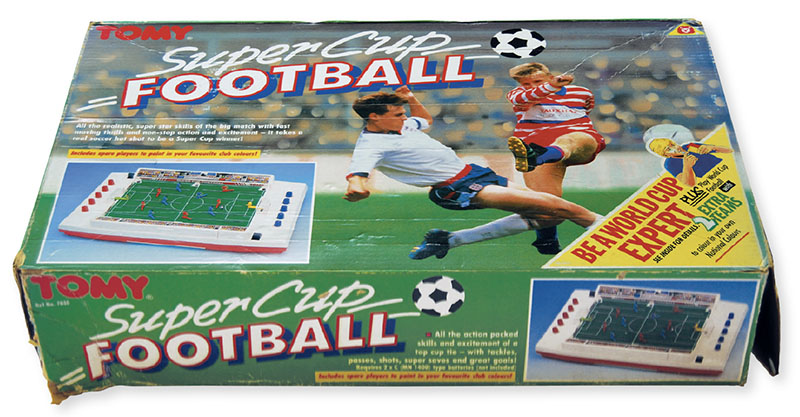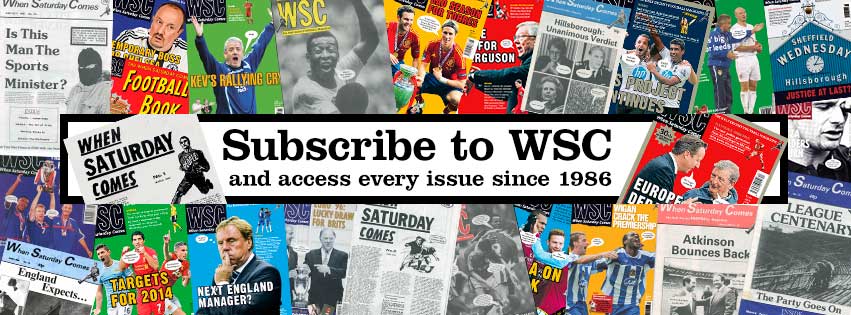
Inaccurate, infuriating and the source of many a family feud, the table-top game still offered the potential for magic moments – until the ball rolled into a blind spot
24 April ~ As a football-obsessed child in the mid-1980s, I got my fix wherever I could. If I wasn’t playing, I was watching it whenever it appeared on TV, or reading about it whenever it wasn’t. But growing up in a house with three football agnostics and one hater, it often felt like a solitary rather than communal interest.
Luckily though, what my family lacked in passion for the sport, they more than made up for in passion for beating each other at things. Subbuteo was too cerebral for us, too slow, and the fact that the ball was almost as tall as the players disproportionately irritated me.
We needed something more accessible and less tactical. There was only one table-top football game with which we could while away Sunday afternoons, and occasionally end them so angry with each other that we would not speak until Monday evening: Tomy’s Super Cup Football.
This was a battery-powered game featuring six players per side, with each outfield player allotted their own groove in the felt pitch. Each human player sat at either end of the tiny stadium, with knobs allowing you to make your men zip up and down their area of the pitch in a straight line – in some ways this was a disciplined take on football which cared little for modern conceits like players having the freedom to express themselves by leaving their zone. You used the same knob to both kick the ball, and to spin the players, giving the game an overall feel of a futuristic shrunken version of table football.
The matches were frenetic and infuriating in equal measure. One of the least enduring features was that it emitted an incessant, high-pitched whir, akin to a barrage of vuvuzelas inside your eardrum. Luckily my brother (the football hater, yet the one I usually ended up playing for hours on end) and I developed a sophisticated system for blocking this out, consisting of spending entire matches berating each other at high volume.
Games could last for anything from five minutes to half an hour; longer if the ball rolled into one of the pitch’s several blind spots from which no player could reach the ball. I am hugely defensive of Super Cup Football, but even I must accept that forlornly spinning your player for three minutes in the hope of nicking the ball back into play did break the spell somewhat. Similarly unrealistic was the fact that a combination of rage and clumsiness regularly led to career-ending injuries such as a player’s head falling off. Tomy included a spare set of unpainted players to deal with such situations. Painting would require patience and thus deprive us of invaluable competitive action.
So instead our version of the game eventually looked as if Kenny Dalglish and Howard Kendall (for it was always a Merseyside derby in our house regardless of whether my brother knew this or not) had got sick of Alan Hansen, Gary Lineker et al’s indiscipline and ordered them to play in skins.
Super Cup Football was not the most accurate depiction of football then, though I have always retained a suspicion that my victories were a result of my greater understanding of the nuances of the sport, my tactics a sort of proto-gegenpressing, albeit with significantly more spinning around.
But regardless, the game takes me back to a specific moment in time. I can picture the exact patch of light green carpet on my parents’ landing that we used to lie on to play it. The sense of wonder at the way in which throw-ins and corners worked has never left me; the ball being magically propelled back into play via bursts of air from holes on the side of the pitch leading to frantic attempts to achieve the holy grail of scoring with a volley directly from a corner.
And, perhaps most importantly of all, I remember the sheer joy of mercilessly inflicting defeat upon my poor brother, thus cementing his resentment of football (and possibly me) forever. In some ways Super Cup Football was the closest I got to sharing my nascent passion for football with my family, so it will always bring back the fondest of memories despite its obvious flaws. Olly Ricketts
This article first appeared in WSC 386, May 2019. Subscribers get free access to the complete WSC digital archive – you can find out more here
